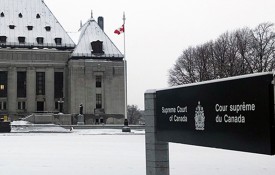Words that convey symbolic violence

This letter was published in French in the May 21, 2022 edition of Le Devoir.
The recent Supreme Court ruling in the Mike Ward case has repercussions that reach far beyond the stand-up comedy show where the case began, as the Commission des droits de la personne et des droits de la jeunesse explained last month when announcing that we would be refocusing our handling of complaints related to claims of discriminatory remarks.
As a result of the Ward ruling, the Commission has had to close dozens of complaint files, primarily involving racist or homophobic slurs. Under the framework established by the Supreme Court, these complaints no longer fall within the investigative jurisdiction of the Commission or the Human Rights Tribunal. From now on, for the Commission to process a complaint about remarks like this, the remarks must have been made in the context of discriminatory harassment, denial of services, denial of housing, racial profiling, or loss of employment.
The Supreme Court’s curtailing of the availability of discrimination proceedings has raised serious concerns among people who are targeted by stigmatizing and dehumanizing remarks. The vast majority of complaints concerning remarks that the Commission receives involve racist remarks including the N-word, used aggressively and degradingly against Black people and other racialized people in a variety of interactions. The Commission finds this very worrying.
People today continue to endure derisive and offensive remarks on the basis of their personal characteristics. Discriminatory, racist, xenophobic, and homophobic remarks and actions are not just personal: they belong to a continuum that includes the individual, systemic, and societal levels. This is why it is so important to combat this phenomenon that has been shown to be detrimental by the Commission and a large body of academic and institutional research.
Serious consequences
This kind of offensive language can have serious consequences because it reveals embedded stereotypical beliefs about historically disadvantaged groups of people who continue to experience discrimination and racism today. Remarks like these damage self-esteem by spreading the idea that the humanity of the people they are directed at is not valued. These experiences can leave deep scars and create feelings of fear and exclusion, in stark contrast to the spirit of the Charter of Human Rights and Freedoms. Racist, homophobic, transphobic, sexist, and ageist remarks can affect people’s sense of belonging to society and their sense of personal safety.
Remarks based on stereotypes can alter the trust relationship between the people who experience them and the rest of society. We also see a risk of intolerant and hateful speech becoming trivialized, with a loss of awareness among the general public as to its harmful effects. In the long run, our social cohesion and ability to coexist are what is at stake. This is why the issue does not solely concern disadvantaged groups, but is in fact the responsibility of society as a whole.
Now more than ever, we must look to the origin and intent of the Charter to understand the full impact of this Supreme Court decision. We must remember the important role of human dignity in shaping rights and freedoms in Québec. The intent of the Charter, as announced in the 1974 statement accompanying the bill that led to its creation, was to solemnly declare the fundamental human rights and freedoms so that they could be guaranteed by the collective will and better protected against any violation, to govern relations between citizens in accordance with human dignity, and to determine the intrinsic rights and freedoms that would ensure the development of every human being.
The Commission’s ongoing commitment
Despite these constraints on the Commission’s power to investigate matters involving remarks, our commitment to ensuring compliance with the principles set out in the Charter remains fully intact. We are determined to continue our investigation, research, education, public awareness, and collaboration work.
More broadly, we call upon Québec society as a whole to take full measure of this situation and to identify appropriate ways of responding to this significant gap in the edifice of our human rights and freedoms.
Let us not collectively lose sight of the goal of equal dignity that lies at the heart of this fundamental law or of the legal protection that has been afforded to dignity for decades.
Myrlande Pierre, Vice-President responsible for the Charter mandate
Philippe-André Tessier, President


